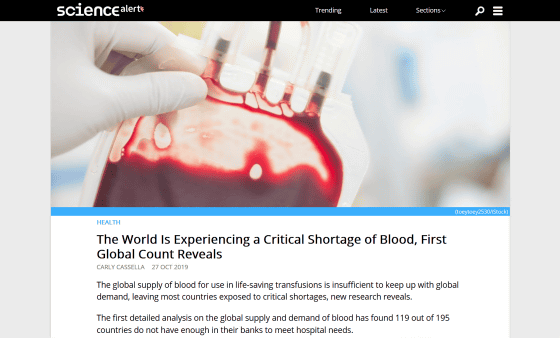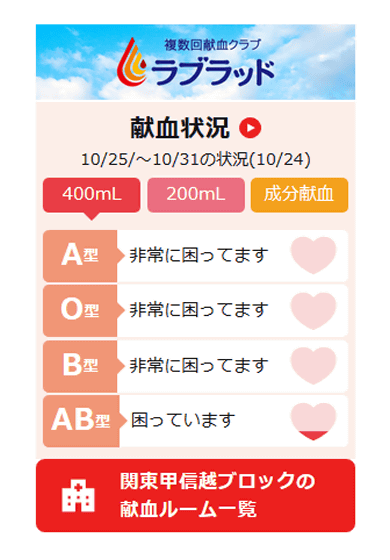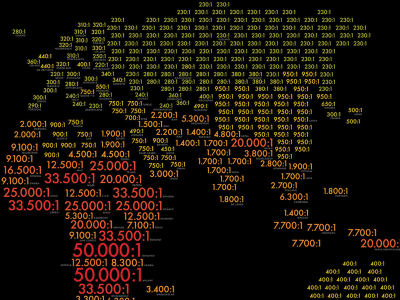New research reveals that serious `` blood shortage '' is occurring all over the world

by
Blood to be used in such as the manufacture of blood transfusion and blood products at the time of surgery, the general from the people blood donation has been financed by, in Japan, the Japanese Red Cross Society , etc. blood donation bus and permanent blood donation room of can make a blood donation The The lack of blood is a problem related to people's lives, but it has been found that serious “blood shortages” occur around the world.
The global need and availability of blood products: a modeling study-The Lancet Haematology
https://www.thelancet.com/journals/lanhae/article/PIIS2352-3026(19)30200-5/fulltext
The Lancet Haematology: First global estimates suggest around 100 million more blood units are needed in countries with low supplies each year | EurekAlert! Science News
https://www.eurekalert.org/pub_releases/2019-10/tl-pss101519.php
The World Is Experiencing a Critical Shortage of Blood, First Global Count Reveals
https://www.sciencealert.com/most-countries-around-the-world-have-hospitals-desperately-short-of-blood

In Japan, blood donation baths and blood donation rooms have been deployed in various locations, but blood shortages have become permanent. Even so, efforts are being made to

A research team at the University of Washington conducted an analysis to estimate the global blood supply and demand gap, and published the findings that '119 out of 195 countries surveyed were lacking blood.' The World Health Organization (WHO) recommends that every country should collect “10-20 donors per 1000 people,” but research teams need it in many countries because blood demand varies by country. Pointed out that the amount of blood has been underestimated.
The research team used WHO data on blood donations for the period 2011-2013 to estimate how much blood and blood products were available in each country. In addition, using data on global disease burden research in 2017, the amount of blood that is considered necessary for the treatment of diseases occurring in each country is calculated, and the gap between the supply and demand of blood collected by donation I have investigated.

by
As a result, the total blood supply worldwide was estimated to be 272 million units with 200 ml of blood donation as one unit, while blood demand in 2017 reached 303 million units. In other words, it was calculated that blood of nearly 30 million units was insufficient all over the world, but it turned out that blood was insufficient in 119 out of 195 countries by country. Blood shortages were particularly pronounced in low- and middle-income countries such as Africa, Oceania and South Asia. In 119 countries where blood shortages were pointed out, the research team said that there was actually not enough blood in excess of 100 million units, which was equivalent to about 1849 units per 100,000 people.
In terms of percentage, South Sudan has the lowest blood supply in the world, collecting only 46 units of blood per 100,000 people, but the amount of blood required for people in South Sudan is 75 times this. It is estimated that it is close. India, whose blood demand is 400% higher than its supply, is the country with the largest absolute blood volume in the world, with 41 million units of blood actually lacking.

by Arvind shakya
“The more people in low and middle income countries have access to treatment, the more demand for blood transfusions will increase,” said Meghan Delaney, a pediatric national hospital who participated in the study. Without structural support, the gap between global blood supply and supply will widen further, ”commented. At the time of this study, blood demand in low- and middle-income countries with fewer complex operations such as chronic diseases was less than in high-income countries.
Christina Fitzmaurice , a blood researcher at the University of Washington who participated in the study, said, “Other studies on blood donation focused on safety, such as the risk of HIV and other infectious diseases. However, our research has identified which countries are experiencing serious blood shortages and found which governments need to make efforts to increase blood donation, expand transfusion services, and provide alternatives. Commented. '

by earringsgirl
Related Posts:
in Science, Posted by log1h_ik







